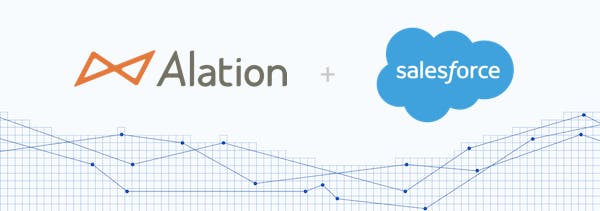Alation and Einstein Analytics Announce Deep Integration For Data Cataloging and Governance

By Stephanie McReynolds
Published on February 20, 2020

The head of sales needs the most up-to-date statistics on the state of the business, and they need it now — well, actually, yesterday. Creating a set of custom reports would take too much time. But why start from scratch? The calculations that describe the state of the business already exist — in hundreds of dashboards and thousands of reports.
The challenge is one of transparency. Who built those reports? What were they trying to achieve? Is this calculation of revenue an accurate definition for our new decision? Why does this report use a non-standard definition of region? In organizations where more and more people are using data, the nuances of business semantics must become more widely distributed knowledge.
Today, we’re excited to announce that Salesforce is bringing the collaborative power of data cataloging to its users with the integration of Einstein Analytics and the Alation Data Catalog.
How the Alation + Salesforce Einstein Analytics Integration Works
With this integration, Alation’s AI-powered data catalog automatically inventories how hundreds to thousands of users in your organization are using analytics today. Alation automatically generates a social catalog page for every asset in Einstein Analytics, increasing the transparency of analytic usage in the organization. It automates the capture of detailed business semantics and uses built-in collaboration features to lower the barrier to knowledge sharing, making your analytics environment, well, social. Alation’s Data Catalog makes finding, understanding and verifying data to ultimately uncover true business insights easy.
Catalog pages not only include a description of the data origins of the report, dashboard or data set, but also the top users, popularity and social upvotes or downvotes provided by colleagues. To build a dashboard for a specific business request, the analyst can now search and find contextually relevant data assets used in other trusted insights and use that knowledge to deliver better quality analytics more quickly.
What makes this work? The Alation Data Catalog uses Behavior I/O, an AI engine that finds the truth within the organizational usage patterns of data. Based on those patterns, Behavior I/O makes recommendations, like which data set is best suited to the analytic question at hand, who the best experts are to reach out to for particular insights, and how data should be labeled for standardization of your business terms.
These recommendations organize the data about your data — what the industry for many years has called metadata. And yet instead of storing this metadata in a vault accessible only by IT experts, Alation makes metadata come alive as a living data recommendation engine for the business. In Gartner’s latest Magic Quadrant for Metadata Management, Alation outranked industry stalwarts like IBM, Oracle and SAP. Now, every Einstein Analytics user can gain the power of Alation’s data recommendations through the Alation Data Catalog.
“We’ve been using Alation internally for more than two years as our solution for data cataloging,” said Hernan Asorey, SVP Product Data Science at Salesforce. “The Alation Data Catalog has significantly increased the productivity of my team of analysts and data scientists, enabling them to quickly find, understand and trust the data they need and increasing time to real business insights.”
In Conclusion
With Alation, AI does the heavy lifting. The result is Governance for Insight, making it easy to ensure accuracy and compliance, while still allowing for a free-flowing approach to data visualization.
Read more about the partnership on Salesforce’s blog here.
- How the Alation + Salesforce Einstein Analytics Integration Works
- In Conclusion








